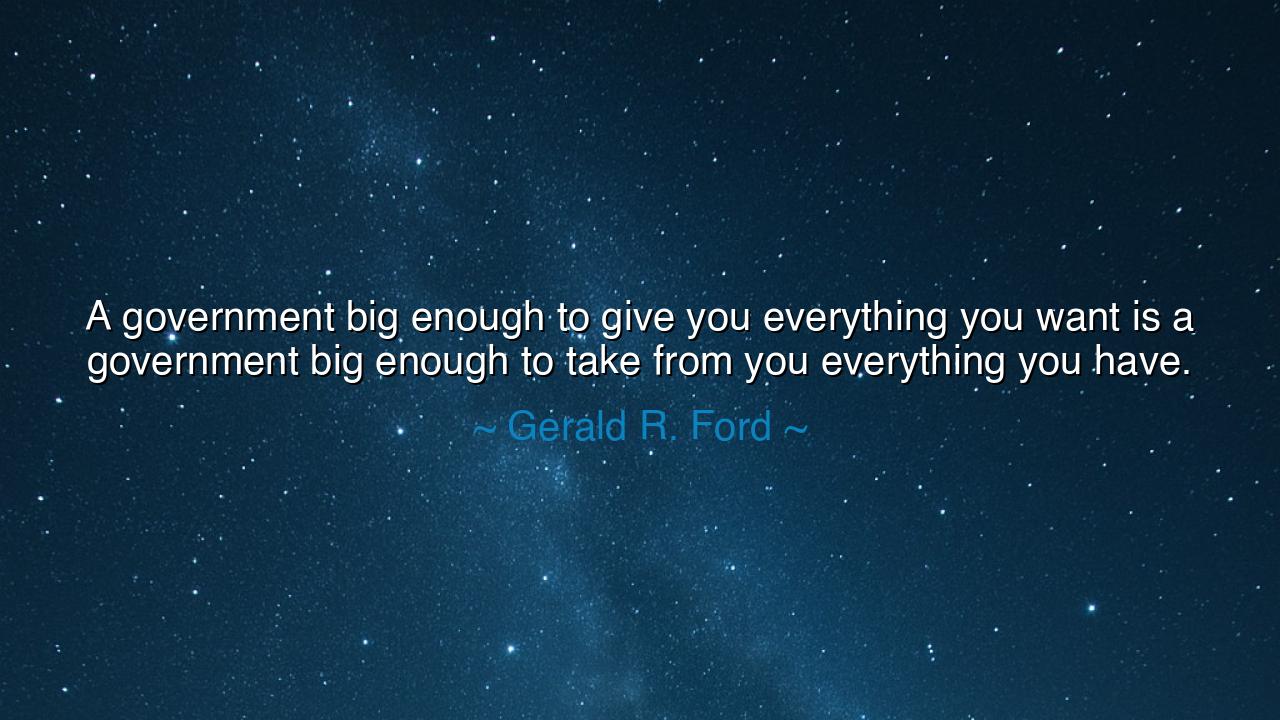
A government big enough to give you everything you want is a
A government big enough to give you everything you want is a government big enough to take from you everything you have.






When Gerald R. Ford declared, “A government big enough to give you everything you want is a government big enough to take from you everything you have,” he spoke with the gravity of a man who had seen liberty from both the heights of power and the fragility of freedom. His words are not merely political — they are moral, almost prophetic. Beneath their simple rhythm lies an eternal warning: that dependence upon authority leads, inevitably, to domination by it. Ford was not condemning compassion, nor rejecting the role of government in society. He was reminding his nation — and all nations — that freedom, once surrendered in exchange for comfort, rarely returns unbroken.
The origin of this quote reaches back to the aftermath of turmoil. Ford assumed the presidency in 1974, a time when America’s trust in government was wounded by scandal and war. He inherited a nation weary of uncertainty, yearning for stability and reassurance. Yet Ford, humble in demeanor but firm in conviction, saw a deeper danger rising — not the corruption of a few men, but the creeping belief that government could serve as the ultimate provider. His words, spoken in his first address to Congress, were forged from the wisdom of experience and the spirit of self-reliance that had shaped the republic since its birth. In his heart, Ford understood a truth as old as civilization: that when people trade freedom for security, they often lose both.
The meaning of his words cuts to the core of human nature. Every empire, every society, begins with noble intent — to protect, to provide, to ensure justice. But as the state grows, so too does its appetite. What begins as benevolence can harden into bondage. When government assumes the power to grant every wish, it must also possess the power to deny them. It cannot give without first taking — from labor, from wealth, from the independence of its citizens. Thus, Ford’s warning was not about policy, but about balance. A free people must remain wary of any authority that claims to be their ultimate source of prosperity. For the giver of all things becomes the master of all things.
History itself bears witness to this truth. Consider the tragedy of the Weimar Republic in Germany. After World War I, the government, desperate to ease the people’s suffering, flooded the nation with promises and paper money. It sought to give — relief, comfort, stability — but instead destroyed the value of its own currency and the faith of its people. From that vacuum of despair rose Adolf Hitler, who offered not just bread, but total control. He promised to restore order and pride, and the people, weary of chaos, gave him everything — their rights, their voices, their lives. The same state that once promised to give them all soon took everything they had. Ford’s warning resounds across that history: the greater the hand that gives, the more terrible the hand that takes.
Even in modern times, this lesson whispers beneath the surface of every nation. Governments that grow too vast, too powerful, begin to smother the very spirit they once sought to protect. Bureaucracy replaces initiative; dependency replaces dignity. And the people, lulled by comfort, forget their strength. The danger Ford spoke of is not merely political tyranny — it is spiritual complacency. It is the death of self-reliance, the quiet surrender of the human will to an authority that promises ease in exchange for obedience. When this happens, the nation no longer belongs to its citizens; the citizens belong to the state.
Yet Ford’s message is not one of despair — it is one of awakening. He calls upon each generation to guard the sacred equilibrium between liberty and order. Government should serve, not possess. It must protect the weak, uphold justice, and maintain peace, but it must never become the source of life itself. The soul of democracy rests not in what government gives, but in what the people build with their own hands — their work, their faith, their courage. A free society is not sustained by entitlement, but by responsibility. Ford’s wisdom reminds us that freedom is not a gift from rulers — it is a duty of the governed.
The lesson is eternal: do not let comfort become your chain. Trust not in governments to make life fair, but in yourselves to make life meaningful. Stand guard over liberty as one guards a sacred flame — for it burns brightest when kindled by effort, not by decree. The people must never forget that every power they grant to government carries a shadow. To give it the power to provide all, is to give it the power to command all. Let Ford’s words echo in every heart: A free man does not ask his master for blessings; he creates them through his own virtue.
So let the teaching be passed down through the ages — seek not a government that gives everything, but one that allows you to earn, to strive, to live. For in that struggle lies the dignity of mankind, and in that dignity, the immortal breath of freedom.






AAdministratorAdministrator
Welcome, honored guests. Please leave a comment, we will respond soon